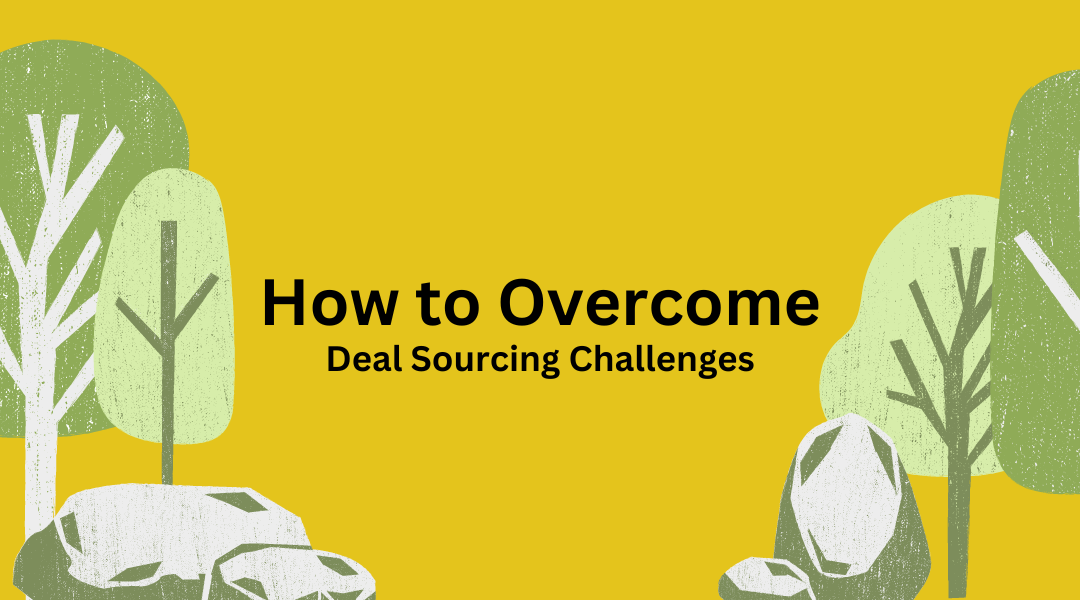Deal sourcing is the lifeblood of any firm engaged in mergers and acquisitions (M&A), private equity, venture capital, or even real estate investments. The process of identifying, evaluating, and acquiring deals that align with a firm’s strategy is both an art and a science. In today’s fast-paced, highly competitive environment, the ability to source and secure deals efficiently can make the difference between a firm that thrives and one that merely survives. However, the path to successful deal sourcing is fraught with challenges that require a strategic and well-informed approach.
The Competitive Landscape: Standing Out in a Saturated Market
The first challenge any deal-sourcing professional will encounter is the sheer level of competition. The market is saturated with firms and individuals, all vying for the same deals. Whether you’re in the bustling financial hubs of New York or London, or even in emerging markets, the reality is the same: everyone is searching for the next big opportunity. This high level of competition means that simply having a strong value proposition is not enough. You need to differentiate yourself in a crowded field.
Most firms tout their unique strengths, but when 100 firms in a room are all claiming to be the best, those differences start to blur. Therefore, it’s not just about what you can offer—it’s about how you offer it. Are you engaging with the right people at the right time? Are you leveraging technology to stay ahead of the curve? Are you building relationships that are both meaningful and mutually beneficial? These are the questions that should guide your approach.
The Timing Conundrum: Being in the Right Place at the Right Time
One of the most critical aspects of deal sourcing is timing. You might have the perfect solution for a client, but if you’re not in the right place at the right time, that opportunity could easily slip through your fingers. The challenge is that you often don’t know when the “right time” is. This uncertainty necessitates a strategy where you are always in the right place—or at least, as often as possible.
Historically, deal sourcing was a more localized activity. If you were based in New York, for example, your primary network would consist of people in New York. Today, technology has obliterated these geographic boundaries, allowing you to build and maintain relationships with potential clients across the globe. Social media, email marketing, webinars, and video conferencing have made it possible to be virtually present anywhere, anytime.
However, with this increased reach comes increased competition. You’re not just competing with firms in your city or country; you’re competing with firms globally. The advantage is that you have the tools to stay connected with your network in real-time, regardless of location. The challenge is ensuring that you’re using these tools effectively to maintain those relationships over the long haul.
Long-Term Relationship Management: The Key to Success
Maintaining a relationship over an extended period is one of the most challenging aspects of deal sourcing. Imagine you meet a potential client today who plans to sell their company in five years. How do you stay relevant and maintain that relationship during the intervening years? This is where the real work begins.
To keep a relationship alive for years, you need to consistently add value. This doesn’t mean bombarding your contact with irrelevant information or constantly pushing for a sale. Instead, it involves a more nuanced approach, where you provide insights, updates, and advice that are genuinely helpful. For instance, you could share industry trends, offer introductions to useful contacts, or provide updates on regulatory changes that might affect their business.
The goal is to be top of mind when the time comes for that client to make a move. This requires a proactive approach, where you are consistently reaching out, but not in a way that feels forced or intrusive. It’s about being a trusted advisor, someone they feel comfortable turning to when they’re ready to act.
Book Recommendation
Try reading Solution Selling: Creating Buyers in Difficult Selling Markets. This book is for you if you have a long sales cycle, intangible offerings, expensive services, or complex products and services. So…..deal sourcing really.
The Role of Technology in Sustaining Relationships
Technology plays a crucial role in maintaining long-term relationships. A robust Customer Relationship Management (CRM) system can help track interactions, set reminders for follow-ups, and store important details about your contacts. This ensures that no one falls through the cracks and that you’re always prepared for your next interaction.
However, a CRM is only as good as the information you put into it. If only a fraction of your team is using the CRM, you’re missing out on valuable data that could help you close deals. Therefore, it’s essential to standardize CRM usage across your firm. This not only ensures consistency but also enhances the overall efficiency of your deal-sourcing efforts.
In addition to a CRM, consider leveraging other tools such as data analytics platforms, email marketing software, and communication tools like Slack or Microsoft Teams. These can help streamline your processes and ensure that your team is always on the same page.
Legal and Compliance Hurdles: Navigating the Regulatory Landscape
As you move through the deal-sourcing process, you’ll inevitably encounter legal and compliance challenges. Different states and countries have different regulations regarding deal sourcing, especially in highly regulated industries like finance or healthcare. It’s crucial to be aware of these regulations and to ensure that your firm is fully compliant.
This might involve obtaining specific licenses, adhering to data privacy laws, or ensuring that your marketing materials meet regulatory standards. While these may seem like minor details, failing to address them can result in significant setbacks, including legal disputes or lost deals.
Moreover, when it comes to pitching a deal, legal hurdles can arise at the last minute. These could include issues related to contracts, intellectual property, or even anti-trust regulations. Being prepared for these challenges and having a plan in place to address them can make the difference between securing a deal and losing it.
The Importance of Consistent Follow-Up
In deal sourcing, follow-up is not just important—it’s essential. The sales cycle for deals can be long, sometimes spanning years. During this time, consistent follow-up is crucial to maintaining the relationship and ensuring that you’re still in the running when the client is ready to make a decision.
However, follow-up doesn’t mean bombarding your contacts with emails or phone calls. It’s about providing value at each touchpoint. This could be in the form of a market report, a relevant industry article, or even a simple check-in to see how things are going. The key is to be persistent without being annoying, to be helpful without being overbearing.
It’s also important to recognize that different clients may prefer different methods of communication. Some may prefer emails, while others might respond better to phone calls or even text messages. Understanding these preferences and tailoring your follow-up strategy accordingly can significantly improve your chances of success.
Adaptability: The Key to Long-Term Success
Finally, it’s important to recognize that the deal-sourcing landscape is constantly evolving. What worked last year might not work this year. The market is dynamic, and so too must be your approach. Regularly evaluate your strategies, be open to feedback, and be willing to adapt as necessary.
For example, if you find that your current approach isn’t generating the leads you need, don’t be afraid to change tactics. This might mean adjusting your follow-up frequency, exploring new technologies, or even shifting your focus to a different market segment. The firms that succeed in deal sourcing are those that are willing to evolve and adapt to changing circumstances.
Deal sourcing is a challenging but rewarding process. It requires a deep understanding of the market, a commitment to building and maintaining relationships, and a willingness to adapt to new challenges. By addressing the obstacles head-on—whether they’re related to competition, timing, relationship management, or legal compliance—you can position your firm for long-term success.
Remember, the key to successful deal sourcing is persistence, consistency, and a focus on adding value at every stage of the process. By staying proactive and leveraging technology effectively, you can overcome the challenges of deal sourcing and secure the opportunities that will drive your firm’s growth for years to come.



